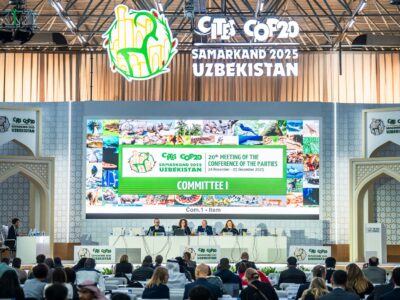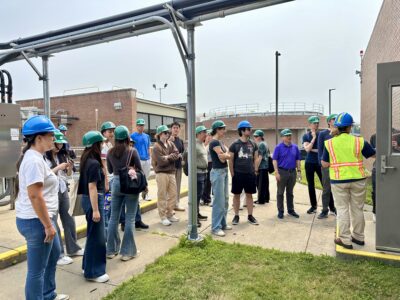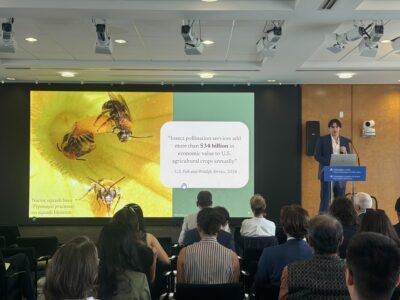
Having studied environmental science as an undergraduate at Rutgers University, current MPA in Environmental Science and Policy (MPA-ESP) student Frank Reig always had an interest in environmental issues but only recently decided that it was something he wanted to pursue professionally. Prior to joining the program, Frank earned a culinary arts degree from the Culinary Institute of America, and worked as a chef in several restaurants throughout Manhattan including Café Boulud, Gramercy Tavern, and Robbins Wolfe Eventeurs. Frank chose the MPA-ESP program because of its New York City location and one-year commitment.
1. What drew you to the Master of Public Administration in Environmental Science and Policy program (MPA-ESP)?
The condensed nature of the program really attracted me. As a career changer, I was specifically looking for a one-year program that would allow me to re-enter the workplace relatively quickly. I also liked the combination of environmental science and public policy, giving me a well-rounded education in the broadly defined field of sustainability, environmental science, and public service. Did I mention I get to live in NYC?
2. What were you doing before you started the program?
I studied environmental science as an undergraduate at Rutgers University. After completing my undergraduate degree, I pursued a culinary arts degree at the Culinary Institute of America. Prior to my enrollment at Columbia, I was working as a chef in several restaurants throughout Manhattan including Café Boulud, Gramercy Tavern, and Robbins Wolfe Eventeurs.
3. What area of environmental policy and management are you most interested in?
I am interested in sustainable development and urban sustainability issues. One of my favorite assignments in the curriculum thus far was reading the entire 2011 PlaNYC. The ability of urban centers like New York to develop economically while providing adequate green space, reasonably priced housing, clean water and tactics to combat climate change are just a few of the problems confronting city centers.
As a former chef, sustainable food systems are also an area of environmental policy that I constantly research. I believe that food security and climate change will be the biggest global issues during the coming decades.
4. What skills and tools do you hope to acquire through the program?
Upon graduation, I hope that I have a firm scientific understanding of many of the major environmental issues affecting communities across the globe. Processing complex scientific research into easily-understood language for policy makers and government officials is another essential skill that I have acquired from the first two semesters of the ESP program. Finally, I hope to develop my accounting skills in financial management class during the spring semester since every managerial job has a budget component.
5. What is your favorite class in the MPA-ESP program so far, and why?
My favorite class has easily been the summer and fall semester Workshop studying legislation on waste-to-energy facilities in the state of Connecticut. Learning how to perform an analysis and to succinctly present complicated scientific data in a short memo and/or presentation will benefit me in any industry or job. I also developed a great relationship with my faculty advisors and consider them to be mentors as I develop my post-graduation plans.
6. How has collaborating with your fellow students in class projects benefitted you professionally and personally?
Collaboration has been a continual theme in all of my ESP classes. Most projects, homework and even papers, are accomplished in groups. Though group projects are not always conflict-free, I have enjoyed the constant element of teamwork overall. These group efforts have helped to create a very tight-knit group of students, which is very unusual in other programs throughout SIPA. Since most jobs in the public and private sphere will require workgroups and consistent collaboration with fellow employees, I will have benefitted greatly once I enter the workforce in several months.
7. Beyond the classroom, what, if any, extracurricular sustainability-related activities have you engaged in with your fellow Environmental Science and Policy students?
I have attended several events as a member of the Student Energy Association (SEA), which were great opportunities to network with fellow ESP students and other SIPA graduate programs. A two-day camping excursion with SEA in the Hudson Valley started several friendships that I hope will continue well after graduation in May. I am also collaborating with several ESP students as part of a United Nations Development Programme(UNDP) internship and a waste management fellowship proposal coordinated by MIT.
8. How do you intend to utilize your degree from the MPA-ESP program to further your career?
I intend to use my education from Columbia University in a public service career at the city or state level. The quantitative skills and management tools developed at SIPA has helped prepare me for many different areas of expertise within the public sector.
Students in the MPA in Environmental Science and Policy program enroll in a year-long, 54-credit program offered at Columbia University’s School of International and Public Affairs, in partnership with the Earth Institute. Throughout this one-year program, students are immersed in courses that combine Columbia University’s hands-on approach to teaching public policy and administration with pioneering thinking about the environment. During the summer semester, students learn the fundamentals of environmental science, while in the fall and spring semesters, they focus on the policy and economics necessary to becoming successful environmental analysts and managers. Visit our website to learn more about the program.



